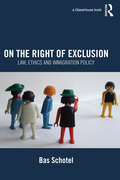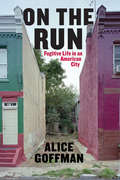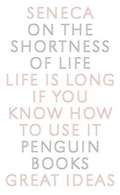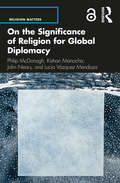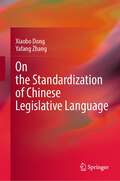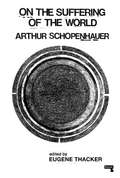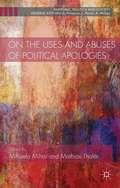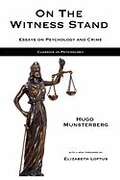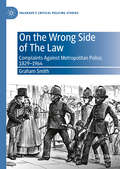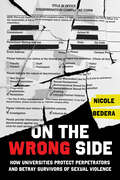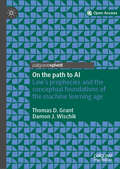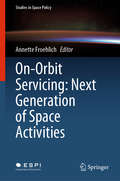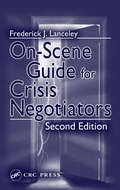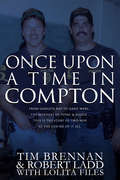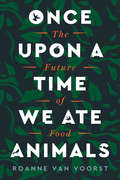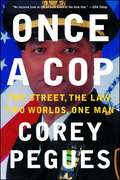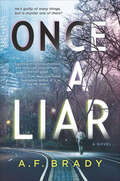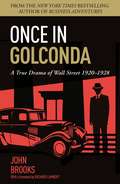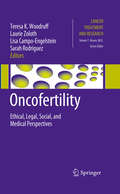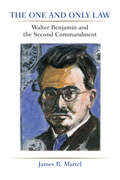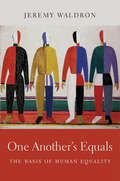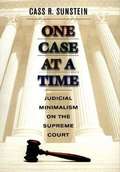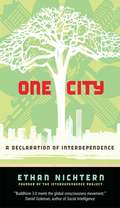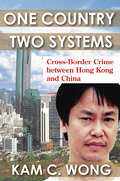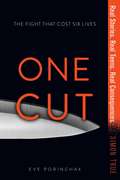- Table View
- List View
On the Right of Exclusion: Law, Ethics And Immigration Policy
by Bas SchotelFirst Published in 2011. Routledge is an imprint of Taylor & Francis, an informa company.
On the Run: Fugitive Life in an American City
by Alice GoffmanThis book is an on-the-ground account of the US prison boom: a close-up look at young men and women living in one poor and segregated Black community transformed by unprecedented levels of imprisonment and by the more hidden systems of policing and supervision that have accompanied them. Because the fear of capture and confinement has seeped into the basic activities of daily living--work, family, romance, friendship, and even much-needed medical care--it is an account of a community on the run.
On the Shortness of Life: Life Is Long if You Know How to Use It
by Seneca C. D. CostaThroughout history, some books have changed the world. They have transformed the way we see ourselves—and each other. They have inspired debate, dissent, war and revolution. They have enlightened, outraged, provoked and comforted. They have enriched lives—and destroyed them. Now, Penguin brings you the works of the great thinkers, pioneers, radicals and visionaries whose ideas shook civilization, and helped make us who we are. Penguin's Great Ideas series features twelve groundbreaking works by some of history's most prodigious thinkers, and each volume is beautifully packaged with a unique type-drive design that highlights the bookmaker's art. Offering great literature in great packages at great prices, this series is ideal for those readers who want to explore and savor the Great Ideas that have shaped the world.The Stoic writings of the philosopher Seneca, who lived from c. 5 BC to AD 65, offer powerful insights into the art of living, the importance of reason and morality, and continue to provide profound guidance to many through their eloquence, lucidity and timeless wisdom. This selection of Seneca's orks was taken from the Penguin Classics edition of Dialogues and Letters, translated by C.D.N. Costa, and includes the essays On the Shortness of Life, Consolation to Helvia, and On Tranquility of Mind. From the Trade Paperback edition.
On the Significance of Religion for Global Diplomacy (Religion Matters)
by Philip McDonagh Kishan Manocha John Neary Lucia Vázquez MendozaWhat could it mean, in terms of strengthening multilateral diplomacy, if the UN, the Organisation for Security and Cooperation in Europe (OSCE), the European Union, and other regional diplomatic frameworks engaged more creatively with a religious perspective? In this ground-breaking volume it is argued that international organisations, backed by governments, can and should use their convening power to initiate new, multi-layered frameworks of engagement, inclusive of the representatives of religion. This can make multilateralism more fit for purpose and have a major impact over time on our planetary future. The book is divided into an introduction and six chapters: Towards a culture of encounter inclusive of the world’s religious traditions Structural questions in 21st-century diplomacy Knowing what we ought to know: the issues that face 21st-century diplomacy Towards the global objective of a common peace for humanity Understanding how change happens The diplomacy of the two standards The development of new frameworks of engagement A brief outline is offered of what an all-European initiative – an agora for Europe – might look like if, in the 2020s, there were the political will to inaugurate a European regional process reflecting the orientation and methodology proposed in the book. Combining cutting-edge research and reflection, with concrete recommendations for academics, religious actors, policy makers, and practitioners, this concise and accessible volume helps to build bridges between these oftentimes separated spheres of engagement.
On the Standardization of Chinese Legislative Language
by Xiaobo Dong Yafang ZhangBy integrating different research angles and methods of philosophy of law, sociology of law, applied linguistics, and legal translation, this book presents a groundbreaking approach to the non-standardization phenomenon in Chinese legislative language, unveils the underlying causes and adverse effects thereof, and provides potential principles, strategies, and methods to be followed in the standardization of Chinese legislative language. Divided into three parts, this book firstly talks about the fuzziness of language, addressing both the active and negative influences thereof on the legislation; secondly approaches the non-standardization phenomenon in Chinese legislative language from the perspective of philosophy of law; and thirdly offers a comprehensive studies on the standardization of Chinese legislative language, offering possible solutions to address the above-mentioned problems and promote the standardized development of law making. This book facilitates the legal practitioners, jurists, law students, legal translators as well as the non-experts to get a better understanding of the mechanism and process of legislation and improve their skills and capacities in apprehending and translating Chinese laws and regulations.
On the Suffering of the World (Penguin Great Ideas Ser. #Vol. 14)
by Arthur SchopenhauerOn the Suffering of the World is a collection of the later aphoristic writings of Arthur Schopenhauer, known for their incisive, aphoristic style and dark, pessimistic view of human existence.Edited and with an introduction by Eugene Thacker, On the Suffering of the World comprises a core selection of Schopenhauer's later writings, gathered together for the first time in print. These texts, produced during the last decades of Schopenhauer's long life, reveal a unique kind of philosophy, expressed in a singular style. Eschewing the tradition of dry, totalizing, academic philosophy prevalent during the time, Schopenhauer's later writings mark a shift towards a philosophy of aphorisms, fragments, anecdotes and observations, written in a literary style that is by turns antagonistic, resigned, confessional, and filled with all the fragile contours of an intellectual memoir. Here Schopenhauer allows himself to pose challenging questions regarding the fate of the human species, the role of suffering in the world, and the rift between self and world that increasingly has come to define human existence, to this day. It is these writings of Schopenhauer that later generations of artists, poets, musicians, and philosophers would identify as exemplifying the pessimism of their era, and perhaps of our own as well. On the Suffering of the World is presented with an introduction that places Schopenhauer's thought in its intellectual context, while also connecting it to contemporary concerns over climate change, the anthropocene, and the spectre of human extinction. The book also includes a bibliography and chronology of Schopenhauer's life.
On the Uses and Abuses of Political Apologies
by Mihaela Mihai Mathias ThalerRecent decades have witnessed a sharp rise in the number of state apologies for historical and more recent injustices, ranging from enslavement to displacement and from violations of treaties to war crimes, all providing the backdrop to displays of official regret. Featuring a host of leading authors in the field, this book seeks to contribute to the growing literature on official apologies by effectively combining philosophical reflection and empirical analysis. It achieves two interrelated goals: it enriches the theoretical debates on the nature and functions of apologies while bringing forth new insights from hitherto unexamined normative horizons. It further addresses often overlooked aspects of political apologies, such as their non-verbal dimension as well as religious overtones, while testing theoretical reflections through encounters with real practices of state apologies. Finally, the book explores the obstacles to, and the limitations of, political apologies. The result is an excellent interdisciplinary volume that affords the reader a better understanding of conditions for a legitimate and successful state apology.
On the Witness Stand: Essays on Psychology and Crime
by Hugo MunsterbergOriginally published by the author in 1908, this classic treatise applies experimental methods to the courtroom and is the foundational text of forensic psychology. With a new foreword by psychologist Elizabeth Loftus (author of Witness for the Defense, Eyewitness Testimony, and The Myth of Repressed Memory) the impact of this work continues to be felt a century after its initial publication. Topics in the book include: the memory of the witness, the detection of crime, untrue confessions, suggestions in court, hypnotism and crime, illusions, and the prevention of crime.
On the Wrong Side of The Law: Complaints Against Metropolitan Police, 1829-1964 (Palgrave's Critical Policing Studies)
by Graham SmithThis book, the first of a two volume study, provides an historical account of complaints against Metropolitan police officers between formation of the force in 1829 and codification of remedies for misconduct under the Police Act 1964. A complainant centred standpoint is developed to counteract the marginalization of the interests of victims, which is held to demonstrate that the drive for effective and efficient law enforcement has overshadowed the public interest in holding officers to account for misconduct. After officer accountability before the criminal courts diminished in the nineteenth century, missed opportunities to reform complaints procedures following commissions of inquiry in 1906-08, 1928 and 1960-62 are discussed. The second volume of the study, Combating Impunity: Complaints Against Metropolitan Police, 1964-2021, will examine the part played by complainants and civil society organisations in combating police impunity in the citizen oversight era.
On the Wrong Side: How Universities Protect Perpetrators and Betray Survivors of Sexual Violence
by Nicole BederaThis explosive investigation reveals the profound failures of the Title IX system and identifies concrete, surprisingly simple steps we can take to protect students. The debate over campus sexual violence is more heated than ever, but hardly anyone knows what actually happens inside Title IX offices. On the Wrong Side provides the first comprehensive account of the inner workings of the secretive Title IX system. Drawing on a yearlong study of survivors, perpetrators, and the administrators who oversaw their cases, sociologist Nicole Bedera exposes the structures that predictably punish survivors who come forward in the service of protecting—or even rewarding—their perpetrators. In doing so, she reveals that the system tasked with ending gender inequality on campus only intensifies it, upending survivors' lives and threatening the degrees that brought them to college in the first place. Equally heartbreaking and optimistic, On the Wrong Side makes it easy to imagine life-changing interventions for the next generation of students by proposing specific solutions to the structural problems of Title IX. Bedera proves that ending campus sexual violence is within our grasp—and dares us to be courageous enough to take action.
On the path to AI: Law’s prophecies and the conceptual foundations of the machine learning age
by Thomas D. Grant Damon J. WischikThis open access book explores machine learning and its impact on how we make sense of the world. It does so by bringing together two ‘revolutions’ in a surprising analogy: the revolution of machine learning, which has placed computing on the path to artificial intelligence, and the revolution in thinking about the law that was spurred by Oliver Wendell Holmes Jr in the last two decades of the 19th century. Holmes reconceived law as prophecy based on experience, prefiguring the buzzwords of the machine learning age—prediction based on datasets.On the path to AI introduces readers to the key concepts of machine learning, discusses the potential applications and limitations of predictions generated by machines using data, and informs current debates amongst scholars, lawyers and policy makers on how it should be used and regulated wisely. Technologists will also find useful lessons learned from the last 120 years of legal grappling with accountability, explainability, and biased data.
On-Orbit Servicing: Next Generation of Space Activities (Studies in Space Policy #26)
by Annette FroehlichThis book shares a range of new and diverse insights on On-Orbit Servicing (OOS), and examines its implications especially from political, legal, economic, and security perspectives. OSS has been evolving rapidly and presents both challenges and opportunities, such as in-space repairs, refuelling, refurbishment of spacecraft and servicing satellites, which could play a critical role in extending satellite lifecycles, while also representing a valuable next step in debris mitigation. At the same time, many legal questions have arisen in connection with OOS: the need to prevent hostile actions under the pretext of OSS; the distinction between governmental and non-governmental OOS operators; the status of re-worked and recycled space objects; the issue of control in terms of operations performed in orbit, i.e., in the international sphere; the status of objects manufactured in orbit and applicable law, including liability and registration; and the impacts on insurance law and risk management. Finally, the book examines the implications of OOS for emerging space actors in the Global South, and recommends a paradigm shift to help developing countries fully recognise the necessity and urgency of being involved in discussions on OSS, as opposed to leaving it up to the developed space actors. This book will be of great interest to practitioners, academics, and students working in the space sector and related fields.
On-Scene Guide for Crisis Negotiators
by Frederick J. Lanceley William R. CrandallAccording to author Frederick J. Lanceley one of the world's foremost crisis negotiation authorities negotiators must train and train regularly. For just as the legal field constantly evolves, so does the field of crisis negotiation. The new edition of On-Scene Guide for Crisis Negotiators reflects this fact. A bestseller in its first edition, this
Once Upon A Time in Compton: From Gangsta Rap To Gang Wars... The Murders Of Tupac And Biggie... . This Is The Story Of Two Men At The Center Of It All
by Lolita Files Robert Ladd Tim BrennanFrom Gangsta rap to gang wars and everything in between…. Former Compton police officers Tim Brennan and Robert Ladd have seen it all….. And now, they’re telling all….. For twenty years, gang unit detectives Tim Brennan and Robert Ladd patrolled the streets of Compton. They witnessed the birth and rise of gangsta rap with acts they knew personally, such as N.W.A and D.J. Quik; dealt firsthand with the chaos of the L.A. riots, its aftermath, and the gang truce that followed; were involved in the investigations of the murders of hip-hop stars Tupac Shakur and The Notorious B.I.G., and were major players in an all-out tug-of-war with City Hall that ultimately resulted in the permanent shut-down of the Compton Police Department. Through it all, they developed an intricate knowledge of gangs and the streets and a methodology that has been implemented by local law enforcement agencies across the country. Their compassionate and fair approach to community policing earned them the respect of citizens and gangbangers alike. This story - told with bestselling author Lolita Files, whose research with Brennan and Ladd has spanned over four years - is a firsthand glimpse into a world during an era many have heard about in song and legend, but have rarely had the opportunity to witness at ground level, from the inside out, through the eyes of two men who witnessed and experienced it all.
Once Upon a Time We Ate Animals: The Future of Food
by Roanne van VoorstCombining the ethical clarity of Jonathan Safran Foer’s Eating Animals with the disquieting vision of Alan Weissman’s bestseller The World Without Us, a thought-provoking, entertaining exploration of a future where animal consumption is a thing of the past.Though increasing numbers of people know that eating meat is detrimental to our planet’s health, many still can’t be convinced to give up eating meat. But how can we change behavior when common arguments and information aren’t working? Acclaimed anthropologist Roanne Van Voorst changes the dialogue. In Once Upon a Time We Ate Animals, she shifts the focus from the present looking forward to the future looking back—imagining a world in which most no longer use animals for food, clothing, or other items. By shifting the viewpoint, she offers a clear and compelling vision of what it means to live in a world without meat.A massive shift is already taking place—everything van Voorst covers in this book has already been invented and is being used today by individuals and small organizations worldwide. Hopeful and persuasive, Once Upon a Time We Ate Animals offers a tantalizing vision of what is not only possible but perhaps inevitable.
Once a Cop: The Street, the Law, Two Worlds, One Man
by Corey PeguesNew York City Book Awards Hornblower Award Winner African American Literary Award Winner for Best Biography/Memoir As a youth, Corey Pegues was a criminal. As an adult, he became a high-ranking police officer.In this fascinating look at life on both sides of the law, Corey Pegues opens up about why he joined the New York Police Department after years as a drug dealer. Pegues speaks honestly about the poor choices he made while coming of age in New York City during the height of the crack epidemic. He&’s equally candid about why he turned his life around, and takes you inside the NYPD, where he becomes a decorated officer despite bureaucratic pitfalls and discriminatory practices. Written with the voice and panache of someone who knows the streets, Once a Cop is a credible and informative look at the forces that lead some into a life of crime and what it means to make good on a second chance.
Once a Liar: A Novel
by A. F. BradyIn this electrifying psychological thriller, a high-powered sociopath meets his reckoning when he’s accused of the brutal murder of his mistress.Did he kill Charlie Doyle? And if he didn’t…who did?Peter Caine, a cutthroat Manhattan defense attorney, worked ruthlessly to become the best at his job. On the surface, he is charming and handsome, but inside he is cold and heartless. He fights without remorse to acquit murderers, pedophiles and rapists.When Charlie Doyle, the daughter of the Manhattan DA—and Peter’s former lover—is murdered, Peter’s world is quickly sent into a tailspin. He becomes the prime suspect as the DA, a professional enemy of Peter’s, embarks on a witch hunt to avenge his daughter’s death, stopping at nothing to ensure Peter is found guilty of the murder.In the challenge of his career and his life, Peter races against the clock to prove his innocence. As the evidence mounts against him, he’s forced to begin unraveling his own dark web of lies and confront the sins of his past. But the truth of who killed Charlie Doyle is more twisted and sinister than anyone could have imagined…
Once in Golconda: A True Drama of Wall Street 1920-1928
by John BrooksAt noon, on September 16, 1920, a horrendous explosion rocked Wall Street, instantly claiming the lives of thirty pedestrians and seriously injuring hundreds more. Yet, for all of its awesome force, that bomb was a firecracker compared to another, much more spectacular one, several years later - the great stock market crash of 1929.Once in Golconda is a dramatic chronicle of the breath-taking rise, devastating fall, and painstaking rebirth of Wall Street in the years between the wars. Focusing on the lives and fortunes of some of the era's most memorable traders, bankers, boosters, and frauds, John Brooks brings to vivid life all the ruthlessness, greed, and reckless euphoria of the '20s bull market, the desperation of the days leading up to the crash of '29, and the bitterness of the years that followed. Writing with authority, verve, and considerable humour, Brooks introduces us to a bygone world in which the likes of Junius Morgan and fellow members of the Yankee "aristocracy" jealously controlled Wall Street as if it were their private hunting preserve. At the centre of this colourful whirlwind of a tale is the magnificently hubristic Richard Whitney. The story of his rise to the presidency of the New York Stock Exchange and his eventual downfall and imprisonment for stock fraud and embezzlement characterizes the play of monumental forces that transformed Wall Street from WASP Camelot to public institution. Though it was first published in 1969, this riveting tale explores timeless themes of profound significance for today's investors - from the corruption that led to the creation of today's securities laws to the folly of investor hubris in a bull market.'A fast-moving, sophisticated account . . . embracing the stock-market boom of the twenties, the crash of 1929, the Depression, and the coming of the New Deal. Its leitmotif is the truly tragic personal history of Richard Whitney, the aristocrat Morgan broker and head of the Stock Exchange, who ended up in Sing Sing.' Edmund Wilson, writing in the New Yorker
Oncofertility
by Lisa Campo-Engelstein Sarah Rodriguez Laurie Zoloth Teresa K. WoodruffOncofertility has emerged as a way to address potential lost or impaired fertility in cancer patients and survivors, with active biomedical research that is developing new ways to help these individuals preserve their ability to have biological children. In order to move beyond oncofertility as a science and medical technology and begin to address the ethical, legal, and social ramifications of this emerging field, we must give voice to scholars from the humanities and social sciences to engage in a multidisciplinary discussion. This book brings together a pool of experts from a variety of fields, including communication, economics, ethics, history, law, religion, and sociology, to examine the complex issues raised by recent developments in oncofertility and to offer advice from national and international perspectives as we create new technology. Given the inherent interdisciplinary nature of oncofertility, this book is not only valuable, but also necessary to cultivate a deep understanding of new issues with the eventual aim of offering proposals for addressing them. Indeed, this book will be useful for people not only within the humanities and social sciences disciplines but also for those who are confronted with cancer and the possibility of impaired fertility and the medical practitioners within oncology and reproductive medicine who are at the front lines of this emerging field.
One And Only Law: Walter Benjamin And The Second Commandment
by James MartelWalter Benjamin's "Critique of Violence," widely considered his final word on law, proposes that all manifestations of law are false stand-ins for divine principles of truth and justice that are no longer available to human beings. However, he also suggests that we must have law--we are held under a divine sanction that does not allow us to escape our responsibilities. James R. Martel argues that this paradox is resolved by considering that, for Benjamin, there is only one law that we must obey absolutely--the Second Commandment against idolatry. What remains of law when its false bases of authority are undermined would be a form of legal and political anarchism, quite unlike the current system of law based on consistency and precedent. Martel engages with the ideas of key authors including Alain Badiou, Immanuel Kant, and H. L. A. Hart in order to revisit common contemporary assumptions about law. He reveals how, when treated in constellation with these authors, Benjamin offers a way for human beings to become responsible for their own law, thereby avoiding the false appearance of a secular legal practice that remains bound by occult theologies and fetishisms.
One Another’s Equals: The Basis of Human Equality
by Jeremy WaldronAn enduring theme of Western philosophy is that we are all one another’s equals. Yet the principle of basic equality is woefully under-explored in modern moral and political philosophy. What does it mean to say we are all one another’s equals? Jeremy Waldron confronts this question fully and unflinchingly in a major new multifaceted account.
One Case at a Time: Judicial Minimalism on the Supreme Court
by Cass R. SunsteinExplains and documents legal minimalism
One City
by Ethan NichternWhat you wear. What you say. What you think/ignore/buy/don't buy... Welcome to One City-Population: Everyone-where EVERYTHING you do matters. You've lived here your whole life, whether you know it or not. Ethan Nichtern, the charismatic and creative force behind New York's upstart Interdependence Project is your guide to the beauty that is everywhere in the urban jungle-in the rattling of subway trains, the screechings of traffic, the hum and drone of millions scurrying for work, food, sustenance, art, culture, and meaning. There may be no greater setting for exploring the great truth that Dr. Martin Luther King Jr. expounded: "Whatever effects one directly, effects all indirectly." One City melds Dr. King's message with modern Buddhist wisdom to offer a new way of understanding what binds us all together-no matter where we are, no matter who. With its pop-culture savvy, humor, and literary liveliness, One City will speak to--and even, it's fair to say, help define--the spiritually-inclined, conscious Next Generation.
One Country, Two Systems: Cross-Border Crime Between Hong Kong and China
by Kam C. WongThe legal issues evoked by cross-border crime in Hong Kong and China are sparse and what does exist is mostly in Chinese. This book provides the first systematic, comprehensive, and in-depth analysis of how Chinese, British, Hong Kong, and international law were applied in the Big Spender case. Kam C. Wong outlines the respective positions of various parties to the dispute. Part of the case's fascination involves competing interests, and that political clout counted for more than legal theory.Big Spender may be little known outside Hong Kong and China, but he made history there. It was the first time a Hong Kong legal resident had been prosecuted, tried, and ultimately executed in China for acts largely perpetrated in Hong Kong. The case tested the limits of the one-country, two-systems approach under which Hong Kong and China coexist. It also forced politicians, government officials, and the public in both Hong Kong and China to come to terms with the legal and policy issues related to cross-border crime.Wong sees the Big Spender case as making clear the dire need for both sides to find workable solutions to concurrent jurisdiction, police cooperation, and judicial assistance. Until there is an acceptable arrangement governing the rendition of offenders between Hong Kong and mainland China, the one- country, two-systems formula cannot be stabilized. This is a case study in large-scale terms.
One Cut (Simon True)
by Eve PorinchakReal stories. Real teens. Real crimes. A backyard brawl turned media circus filled with gang accusations turns a small, quiet town upside down in this second book in the new Simon True series.On May 22, 1995 at 7 p.m. sixteen-year-old Jimmy Farris and seventeen-year-old Mike McLoren were working out outside Mike’s backyard fort. Four boys hopped the fence, and a fight broke out inside the dark fort made of two-by-four planks and tarps. Within minutes, both Mike and Jimmy had been stabbed. Jimmy died a short time later. While neighbors knew that the fort was a local hangout where drugs were available, the prosecution depicted the four defendants as gang members, and the crime as gang related. The accusations created a media circus, and added fuel to the growing belief that this affluent, safe, all-white neighborhood was in danger of a full-blown gang war. Four boys stood trial. All four boys faced life sentences. Why? Because of California’s Felony Murder Rule. The law states that “a death is considered first degree murder when it is commissioned during one of the following felonies: Arson, Rape, Carjacking, Robbery, Burglary, Mayhem, Kidnapping.” In other words, if you—or somebody you are with—intends to commit a felony, and somebody accidentally dies in the process, all parties can be tried and convicted of first degree murder and sentenced to life without parole, even if nobody had any intention of committing a murder. What really happened that day? Was it a case of robbery gone wrong? Gang activity? Or was it something else?
